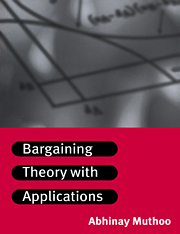9 - Asymmetric Information
Published online by Cambridge University Press: 24 November 2009
Summary
Introduction
In some bargaining situations at least one of the players knows something of relevance that the other player does not. For example, when bargaining over the price of her second-hand car the seller knows its quality but the buyer does not. In such a bargaining situation, the seller has private information; and there exists an asymmetry in information between the players. In this chapter I study the role of asymmetric information on the bargaining outcome.
A player may in general have private information about a variety of things that may be relevant for the bargaining outcome, such as her preferences, outside option and inside option. However, in order to develop the main fundamental insights in a simple manner attention is focused on the following archetypal bargaining situation. A seller and a buyer are bargaining over the price at which to trade an indivisible object (such as a second-hand car, or a unit of labour). The payoff to each player (from trading) depends on the agreed price and on her reservation value. A key assumption is that at least one player's reservation value is her private information.
I begin the study of this bargaining situation by addressing the normative question of whether or not the bargaining outcome can be ex-post efficient. Let me make this question a bit more precise. A bargaining procedure combined with the players' information and preferences in the bargaining situation under consideration defines a bargaining game with imperfect information.
- Type
- Chapter
- Information
- Bargaining Theory with Applications , pp. 251 - 294Publisher: Cambridge University PressPrint publication year: 1999



